Professor Bart Currie
Theme leader, Tropical and Emerging Infectious Diseases
Qualifications:
Fellow (Honorary) of the Australasian College of Dermatology, 2023; PhD, Charles Darwin University, 2022;Fellow of the Australian Faculty of Public Health Medicine, Royal Australasian College of Physicians, 1990; Fellow, Royal Australasian College of Physicians, 1985; Diploma of Tropical Medicine and Hygiene, London School of Tropical Medicine and Hygiene, 1985; Bachelor of Medicine and Bachelor of Surgery, University of Melbourne, 1978.
Approved level of HDR supervision at Charles Darwin University:
Principal Supervisor for PhD
Location:
Darwin - Royal Darwin Hospital campus
Biography:
Prof Currie’s work focusses on coordinating links between clinicians, public health colleagues and other service providers, laboratory scientists and community.
Initially head of the early Menzies Clinical Division and then Interim Director of Menzies from August 2005 to March 2006, Prof Currie now leads the Tropical and Emerging Infectious Diseases team within the Global and Tropical Health Division. He is Professor in Medicine at the Northern Territory Medical Program, Flinders University, Adjunct Professorial Fellow at Charles Darwin University and Adjunct Professor at James Cook University. He works as a senior staff specialist physician at Royal Darwin Hospital, where he was Director of Infectious Diseases until 2019.
He was Director of RHDAustralia until January 2021 and Director of HOT NORTH (NHMRC-funded Improving Health Outcomes across Northern Australia Program) until December 2021. He was appointed to the Technical Reference Group for the Australian Government’s Regional Health Security Initiative in July 2017 and the National COVID-19 Health and Research Advisory Committee (NCHRAC) in April 2020. He was Chair of the Scientific Advisory Committee of the CRE CREID and Chair of the Expert Reference Panel of the CRE APPRISE.
His collaborations across Central and Northern Australia and with clinical and scientific colleagues elsewhere in Australia and overseas have resulted in over 700 peer-reviewed publications.
Prof Currie has peer reviewed grants for the NHMRC since the 1990s and has peer reviewed for 58 journals, including The Lancet, The New England Journal of Medicine and a range of PLoS and BMC open access journals. He has supervised 23 successfully completed PhDs.
Research Themes
- Tropical and emerging infectious diseases
- Melioidosis
- Snakebite and tropical toxinology
- Scabies and skin infections
- Rheumatic heart disease
- Zoonoses and environmental pathogens
- Top End Health Partners - Improving Health Outcomes in the Tropical North: A Multidisciplinary Collaboration
- The Darwin Prospective Melioidosis Study (DPMS)
- Improving diagnostics
- Improving therapy
- Using bacterial genomics to understand the epidemiology of melioidosis at local (Darwin and NT), regional (Australia) and global levels
- Anthropogenic, climate and environmental drivers of the local, regional and global spread of melioidosis
- The Darwin Prospective Snakebite Study
- Working toward a scabies control strategy for northern Australia
- Wiersinga WJ, Currie BJ, Peacock SJ. (2012) Melioidosis. N Engl J Med; 367(11):1035-44.
- Currie BJ, McCarthy JS. (2010) Permethrin and ivermectin for scabies. N Engl J Med;362:717-722.
- Currie BJ. (2015) Melioidosis: Evolving concepts in epidemiology, pathogenesis and treatment. Semin Respir Crit Care Med; 36(1):111–25.
- Currie BJ. (2015) Editorial: Scabies and global control of neglected tropical diseases. N Engl J Med;373:2371-2372.
- Currie BJ, Kaestli M. (2016) A global picture of melioidosis. Nature; 529:290-291.
- Currie BJ. (2020) Burkholderia pseudomallei and Burkholderia mallei: Melioidosis and glanders. In: Bennett, Dolin and Blaser (Eds). Principles and Practice of Infectious Diseases. 9th Edition. Elsevier, Philadelphia. pp.2706-2715.
- Currie BJ, Ralph AP (Eds). (2020) The 2020 Australian guideline for the prevention, diagnosis and management of acute rheumatic fever and rheumatic heart disease. 3rd Edition. Rheumatic Heart Disease Australia, Darwin.
- Currie BJ, Mayo M, Ward LM, et al. (2021) The Darwin Prospective Melioidosis Study: a 30-year prospective, observational investigation. Lancet Infect Dis;21:1737-1746.
- Currie BJ. (2022) Melioidosis and Burkholderia pseudomallei: progress in epidemiology, diagnosis, treatment and vaccination. Curr Opin Infect Dis;35:517-523.
- Gee JE, Bower WA, Kunkel A, …...…., Currie BJ, et al. (2022) Multistate outbreak of melioidosis associated with imported aromatherapy spray. N Engl J Med; 386:861-868.
Click here to view more Bart Currie publications in PubMed.
-
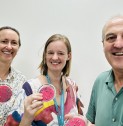
Febrile Podcast #94 - Of Microbes and Mud
Checkout Professor Bart Currie in this podcast discussing a melioidosis case study, with clinicians Dr Catherine Marshall and Dr Genevieve Martin.
-
MEDIA RELEASE | Menzies researchers in the top 2 per cent
Menzies School of Health Research is celebrating the work of its researchers who have been ranked amongst the world’s top scientists.
-

Sunday Territorian | Medical school critical for NT
AS a local born and bred Aboriginal Territorian, having worked in both levels of government and Aboriginal community-controlled organisations and for the past 16 years as the chief executive for the Aboriginal Medical Services Alliance Northern Territory (AMSANT), I understand and have actively promoted the need to grow our own local medical workforce.
-

NT News | School's strategic board appointed
Leading medical expert Len Notaras has been appointed the Chairman of the Charles Darwin University Menzies School of Medicine strategic board.
-
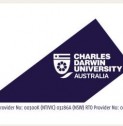
CDU Newsroom | New Board appointed to CDU Menzies School of Medicine
Charles Darwin University (CDU) has announced a new Strategic Board for the CDU Menzies School of Medicine.
-

New York Times Post | Australians told not to go outside to avoid deadly bacteria
Northern Territory residents have been warned not to go outside or they could be killed by an airborne bacteria.
-

Sunday Territorian | Deadly bacteria cases surge
Cases of the fatal Nightcliff Gardener's Disease, or melioidosis, have blown past predictions so far this wet season.
-

Nine News | Melioidosis
-

Researchers at CDU some of the most influential in their fields
According to a Stanford University study, there were 22 academics from CDU and Menzies School of Health research who ranked in the top two per cent of researchers referenced in their respected disciplines for 2020.
-

NMRC Researchers Utilize a Unique Study Platform to Examine Multiple Diseases in Australia
Researchers from the United States Naval Medical Research Center (NMRC) works in collaboration with Professor Bart Currie from Menzies School of Health Research, one of the world's foremost authorities on melioidosis.
-
Q&A: What You Need to Know About Melioidosis
CDC investigators continue to search for the source of the bacteria that caused four infections—two of them lethal—in four different states. The Scientist spoke with melioidosis expert Bart Currie about the disease.
-

NT News | Melioidosis death rates drop to 6%
THE mortality rate for melioidosis, a soil dwelling disease, has dropped in the last 30 years, while the number of diagnosed cases has increased.
-

Nine News Darwin: Fewer Deaths From Melioidosis
-
ABC Online | Thirty-year Menzies melioidosis study finds cases are rising but mortality has tumbled
Lead author Bart Currie from the Menzies School of Health Research said the mortality rate for people diagnosed with melioidosis plummeted over the lifetime of the study.
-
Fewer deaths from melioidosis direct result of 30-year study
The number of deaths /mortality rate in Darwin from an infectious disease found mostly in the tropics, melioidosis, has decreased from 31 to six per cent in the last 30 years a new paper published in The Lancet Infectious Diseases Journal has found.
-
9 News Darwin | Melioidosis warning
The Top End is facing an increased threat to a deadly disease that claimed a life in the Territory last year. As Zarisha Bradley reports medical experts are warning of the rising risk after recent monsoonal weather.
-
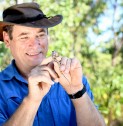
CDU academics named among world’s most influential
Menzies School of Health Research Professor Bart Currie, Professor Anne Chang AM, Professor Ric Price, Associate Professor Steven Tong, Professor Nicholas Anstey, Professor Joshua Davis, Professor Alan Cass, Professor Peter Morris and Professor Amanda Leach
-
ABC News | Melioidosis story
Featuring Menzies' melioidosis experts, Dr Audrey Rachlin and Prof Bart Currie.
-

Irukandji concerns heating up
The prevalence of highly venomous and potentially deadly box jellyfish is set to increase in Territory coastal waters as temperatures and humidity rise.
-
HOT NORTH Impact Report
Now available | The report presents 12 case studies showing the impacts from the first three years of the HOT NORTH program.
-
An open letter from 119 scientists and researchers to The Lancet
Signed by clinicians, medical researchers, statisticians, and ethicists from across the world, follows the publication of a paper on using hydroxychloroquine or chloroquine for the treatment of COVID-19.
-

Pill shows promise in eradication of scabies
Researchers are making progress in developing a single tablet to eliminate scabies. It is being trialed in the Northern Territory by a team from Menzies.
-
Be snake wise!
Royal Darwin Hospital infectious diseases physician and snake expert Professor Bart Currie said the RDH emergency department receives on average one to two snakebite patients per week at this time of year.
-

Tropical disease kills crocodiles in NT
A deadly tropical disease that affects humans was responsible for killing two crocodiles near Darwin, flipping previously held beliefs the predators were highly resistant to infection.
-
ABC Online | Deadly bacteria killed two crocodiles in northern Australia, despite species being highly resistant
Crocodiles may not be as highly resistant to infections as previously thought, as a newly released study shows a deadly bacterium was responsible for killing two saltwater crocs in the Top End.
-
Deadly bacteria killed two crocodiles in northern Australia
The research, from Menzies School of Health Research was published in the Microbial Genomics journal.
-
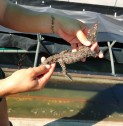
Media Release | Crocodile killing bacteria identified by Top End researchers
A ground-breaking study by a north Australian research team which identified a deadly bacterium responsible for killing saltwater crocodiles at a Top End Wildlife Park has recently been published in the journal, Microbial Genomics.
-

Killer disease strikes crocs
Melioidosis is killing Territory crocodiles, according to a paper written by researchers at the Menzies School of Health Research.
-
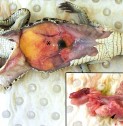
Media Alert | Crocodile killing bacteria identified by Top End researchers
A north Australian research team has identified a deadly bacterium responsible for killing saltwater crocodiles at a Top End Wildlife Park.
-
Source water key to bacterial water safety in remote Northern Australia
In the new work, Mirjam Kaestli of Charles Darwin University, Australia and colleagues including Menzies School of Health Research sampled water and biofilms from three remote Indigenous communities in Australia’s Northern Territory.
-
Media Release | Source water holds key to bacterial water safety in remote North
CDU Research Fellow Mirjam Kaestli and colleagues including Menzies School of Health Research sampled water and biofilms from three remote Indigenous communities in the Northern Territory.
-

Skin disease a 'national crisis'
NT News report on the HOT NORTH One Disease Skin Symposium attend by Australia's first Indigenous dermatologist Larrakia woman Dr Dana Slape
-
First Aboriginal Australian Dermatologist to Attend Skin Health Symposium in Darwin
This week Larrakia woman, Dr Dana Slape, Australia's first Aboriginal dermatologist, is back home to country to attend a Skin Health Symposium
-
A wet cough for four weeks means it’s time to get it checked out
Dr André Schultz and Ms Pamela Laird receive funding from the NHMRC and Hot North grant funding through Menzies School of Health Research.
-

Tropical health HOT topic at forum
The health of people living in the North West was discussed at a key forum in Port Hedland recently involving national and local experts in the field.
-
Media Release | HOT NORTH Katherine Health Translation Workshop 14-15 March 2019
HOT NORTH Katherine Health Translation Workshop 14-15 March 2019
-
Youth leaders learn about health hurdles of NT
Th Sun Newspapers | The Ship for World Youth Leaders (SWY) program, have visited the Menzies School of Health Research (Menzies)
-

Cases of deadly dirt disease melioidosis will increase, expert warns
Professor Bart Currie from the Menzies School of Health Research said he expected the melioidosis bacteria would increase in tropical regions.
-

International youth leaders sail into Menzies School of Health Research
The Ship for World Youth Leaders (SWY) program, have visited the Menzies School of Health Research (Menzies) to learn about some of the key public health challenges in the region.
-

NMRC Strives to Reduce Risk of Melioidosis Among Deployed Sailors and Marines
Dr. Kevin Schully, contractor and chief science officer with Naval Medical Research Center’s (NMRC) Austere environments Consortium for Enhanced Sepsis Outcomes Department (ACESO) recently retuned stateside after screening Sailors and Marines deployed to Darwin, Australia, who are at risk of developing melioidosis.
-

HOT NORTH Thursday Island Teaching Workshop
Health professionals from around Queensland have gathered on Thursday Island for the much-anticipated HOT NORTH regional teaching workshop on 24-25 July.
-

Why aren't there stinger nets so people can swim at Darwin beaches?
Professor Bart Currie contributes to the "Curious Darwin" story.
-
Territory sporting great, tough battle with melioidosis | NT News
Former Essendon great Michael Long credits Professor Bart Currie for his diagnosis and treatment for melioidosis.
-
HOT NORTH Visiting Fellow, Arca Testamenti Travels to Darwin
HSP recently partnered with the Menzies School of Health Research in Darwin, Australia to support a HOT NORTH Visiting Fellowship for an exceptional graduate student from Indonesia’s Bogor Agricultural University.
-
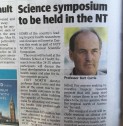
NT News | HOT NORTH ASM
NT News report on the HOT NORTH Annual Scientifiv Symposium.
-
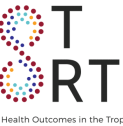
HOT NORTH researchers gather in Darwin
The HOT NORTH research initiative will be holding its inaugural Annual Scientific Symposium at Menzies School of Health Research (Menzies) in Darwin, from 24 to 25 May, 2018.
-
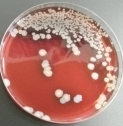
Pain free golden staph treatment cleared for use in remote communities
A northern Australian research team has provided reassuring support for the continued use of an oral treatment option for patients with skin infections, finding that there has been inaccurate reporting of resistance to the recommended antibiotic.
-
National Healthy Skin Guideline
-
Katherine doctors push for more public housing
Katherine Times reports on the HOT NORTH Teaching Workshop.
-

HOT NORTH Katherine Teaching Workshop 20-21 February
HOT NORTH, a four-year National Health and Medical Research Council (NHMRC) funded research program led by Menzies School of Health Research (Menzies), is hosting a teaching workshop in Katherine, Northern Territory from 20-21 February 2018.
-
Territory FM | Mornings with Mel Little. Professor Bart Currie
ASK AN EXPERT: Wednesday the 7th of February 2018 Professor Bart Currie, HOT NORTH Program.
-

HOT NORTH 2018 funding awards released: Building the health research workforce in northern Australia
A total of 13 new health research projects have been announced as part of HOT NORTH, a four-year National Health and Medical Research Council (NHMRC) funded program led by Menzies School of Health Research (Menzies).
-

Inspire magazine | HOT NORTH
HOT NORTH Director, Menzies’s Professor Bart Currie envisages that, “by building the capacity of health professionals and scientists in northern Australia, we’re working towards improvements in health outcomes not only for Australia, but also the Asia-Pacific region.
-

Developing Northern Australia 2017 Implementation Report
Page 20 - Case Study | The Australian Government funded HOT NORTH project has hit the ground running in 2017, and is building north Australia’s expertise and capacity in tropical medicine through research projects that will transfer new knowledge to communities.
-

MRSA shifting from hospitals to community
MJA InSight Issue 42 / 30 October 2017 - The epidemiology of methicillin-resistant Staphylococcus aureus (MRSA) has changed, and efforts to control transmission must also shift to include community settings as well as more traditional hospital surveillance and control programs, according to the authors of research published in the MJA.
-

HOT NORTH: A community of excellence in tropical medicine
The Australian Government funded HOT NORTH project has hit the ground running in 2017, and is building north Australia’s expertise and capacity in tropical medicine through research projects that will transfer new knowledge to communities.
-

Melioidosis study improves patient outcomes
Melioidosis study improves patient outcomes Our research continued to put Menzies at the centre of better melioidosis patient outcomes through improved diagnosis and treatment. In August 2016, the Menzies melioidosis team contributed to 17 abstracts at...
-

Territory Q features HOT NORTH
Read about our HOT NORTH collaboration in the latest Territory Q Magazine.
-

Australian native animals spreading scrub typhus mite prompt warning
Scrub typhus is just one of many tropical diseases in the NT that are not so well known down south.
-
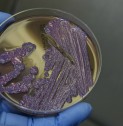
Melioidosis: More cases of potentially fatal bacteria from NT dirt emerge
More people are being infected by a potentially fatal bacterium in the Northern Territory, and health experts suspect building works could have something to do with the rise in cases.
-

HOT NORTH Fellowships to improve health outcomes in the tropics
Five post-doctoral health professionals have been awarded Fellowships to help close critical gaps in health outcomes in northern Australia and the Asia-Pacific region as part of the unique collaborative program Improving Health Outcomes in the Tropical North (HOT NORTH), led by the Darwin-based Menzies School of Health Research (Menzies).
-

Menzies helps track the travels of the deadly melioidosis bacteria
An international team of experts has confirmed the Australian origins of the bacterium (Burkholderia pseudomallei) which causes the potentially fatal infectious disease melioidosis and tracked its global dissemination.
-

Melioidosis: The Most Neglected Tropical Disease
Three sessions at the American Society for Microbiology 2017 Biothreats conference covered specific emerging diseases. Two of these, Zika and Ebola, have received a lot of media coverage (including on this blog), but the third disease, melioidosis, isn’t frequently found in newspaper headlines.
-

Funding boost to tackle health challenges in northern Australia
Work will begin to help close critical gaps in healthcare across northern Australia as the result of a $6m grant awarded today to Menzies School of Health Research (Menzies) by the National Health and Medical Research Council (NHMRC).
-

A global picture of melioidosis
The bacterium Burkholderia pseudomallei is found in soil and water and causes the disease melioidosis in humans and animals. It was upgraded to a Tier 1 Select Agent by the US Centers for Disease Control and Prevention in 2012 — the designation given to pathogens considered of highest risk.
-
Trial results hold hope for scabies prevention
A NEW trial that reduced scabies outbreaks by 94 per cent in one year could hold the key to its prevention in indigenous communities in the Territory.
-
AUSTRALIAN RESEARCHERS PLAY VITAL ROLE IN ADDRESSING THE GLOBAL SCABIES CRISIS
In a world-first study, treatment of a whole community with oral ivermectin has been shown to virtually eliminate scabies, providing new hope in the fight to control this debilitating disease.
-
Menzies melioidosis project recognised among Australia's best
A Menzies project has been recognised amongst the nation’s premier research projects by Australia’s peak body for health and medical research.
-

ABC Catalyst: Melioidosis feature
Life in northern Australia is full of spectacular surprises and natural hazards, some more obvious than others.
-

National boost for new Indigenous and tropical health research
The Menzies School of Health Research (Menzies) has been awarded federal funding for 12 competitive grants and fellowships to help improve outcomes for disadvantaged populations in Australia and the Asia- Pacific region.
-

The melioidosis files
A potentially fatal bacterial disease, lurking in soil.


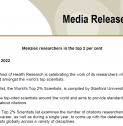


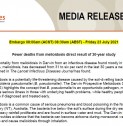

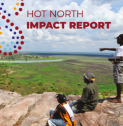

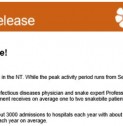



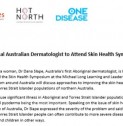

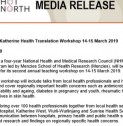



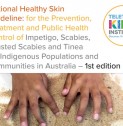


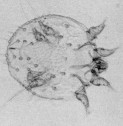
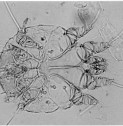
.JPG&w=123&h=126)